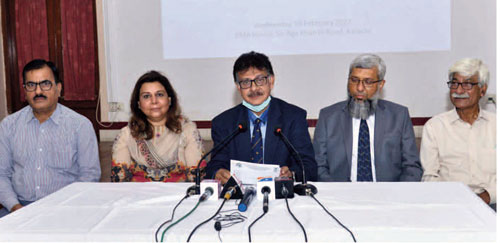Pakistan Medical Association (PMA) welcomes all of you to this press conference.
My name is Dr. S.M.Qaisar Sajjad, Hon. Secretary General PMA Centre. I am conducting this press conference along with Dr. Syed Muhammad Zahid Azam, Prof. of Medicine & Gastroenterology /Hepatology, Dr. Qazi M. Wasiq, Hon. Treasurer PMA Centre, Dr. Sonia Naqvi, Hon. President PMA Karachi, Dr. Abdul Ghafoor Shoro, Hon. General Secretary PMA Karachi.
PMA has always provided awareness on health issues and on different diseases. We always stress upon prevention of the diseases because we believe that prevention is better than cure. We are always in frontline to provide awareness and prevention of different diseases as we have been providing awareness for more than two years on coronavirus. Regarding coronavirus we warned the government one month before the eruption of covid-19 in Pakistan.
It is necessary for us all to take care of our health. If there is problem in any part of a body it will affect the whole body. Same is the case of Digestive System; sufferings like abdomen spasm, acidity, nausea, flatulence are very common. If these symptoms persist for a long time, the patient should visit doctor because it could lead to a serious illness if ignored.
Stomach diseases in Pakistan are getting serious rapidly. For the last many decades it is being considered that depression, spicy food, and smoking in any form causes stomach ulcer but in 1982 after discovering the bacteria Helicobacter pylori, it was revealed that this bacteria is often the cause of stomach ulcer. 80% population of Pakistan is suffering from Helicobacter pylori which are the main reason of stomach diseases in Pakistan.
Symptoms of H. Pylori include ache or burning pain in your abdomen which could worsen when your stomach is empty, Nausea, loss of appetite, frequent burping, bloating and Unintentional weight loss.
People can swallow H. pylori bacteria from contaminated food, water, or eating utensils. Infections are most common in crowded areas and those without clean water or good sewage systems. Infected person can pass the bacteria through their saliva (spit) and other body fluids.
Pylori have been considered associated with acute and chronic gastritis, gastric and duodenal ulcers, lymphoma and even cancer. Like all developing countries, Pakistan also has high H. pylori prevalence reported in the range of 50–90%. Clinical studies have proved that H. Pylori bacteria increase the risk of stomach cancer.
To diagnose the bacteria we usually have blood test or stool test in Pakistan which are bothersome for patient. The result of these tests is delayed from two to four days and patient remains in trouble during this period.







